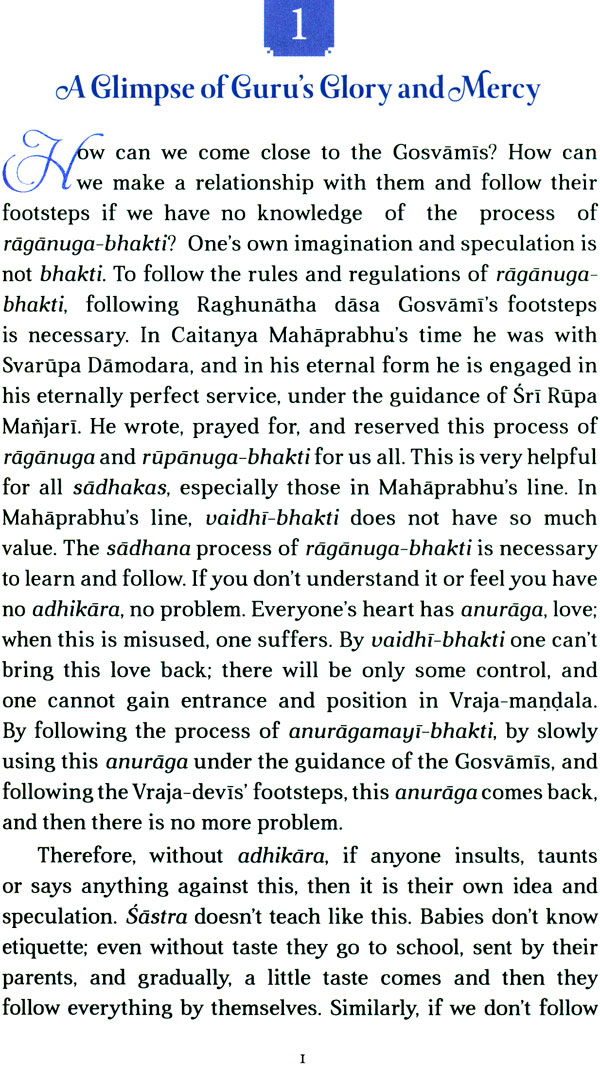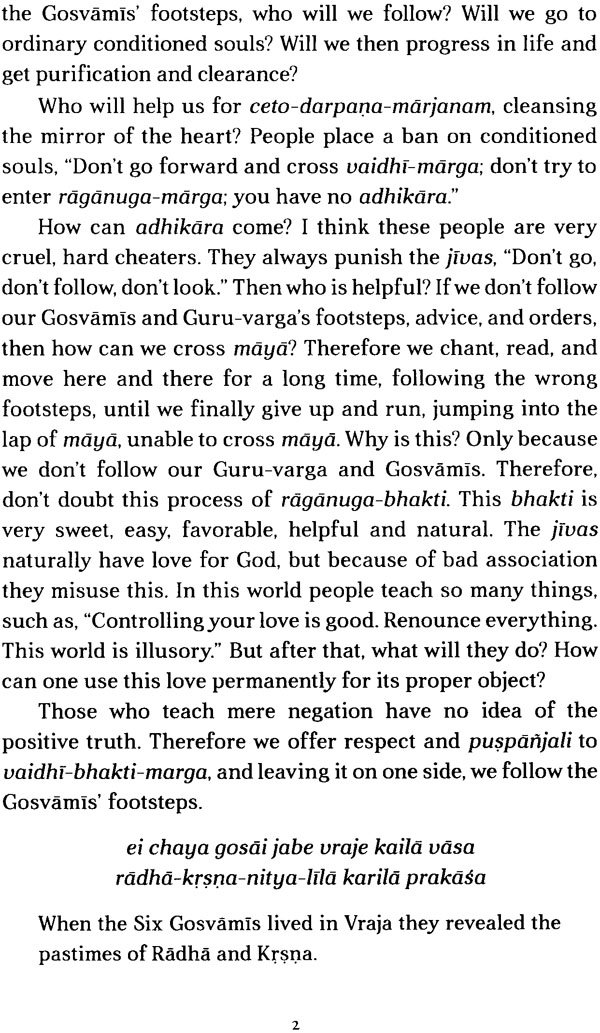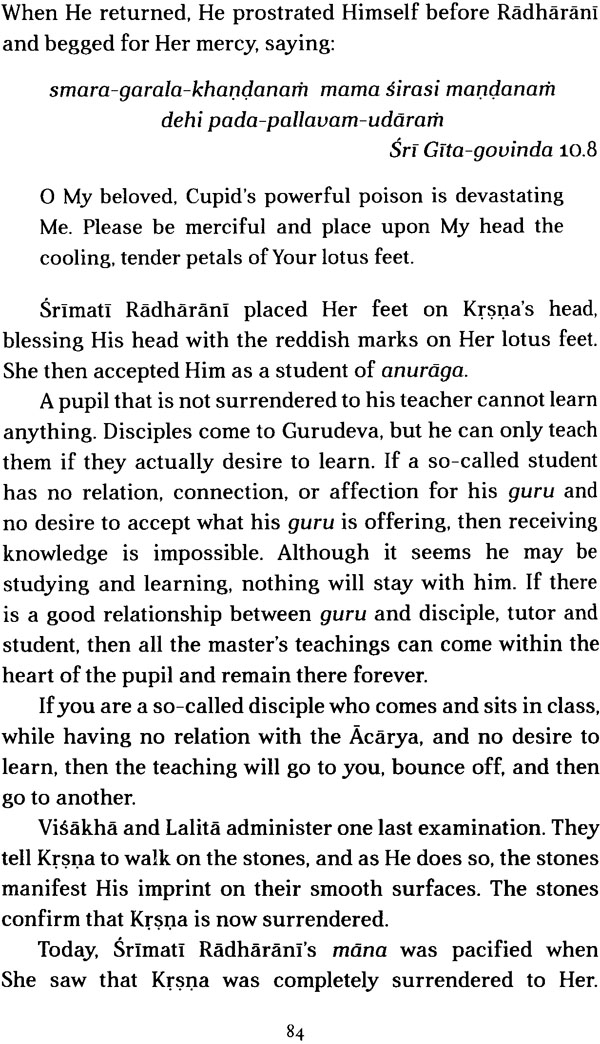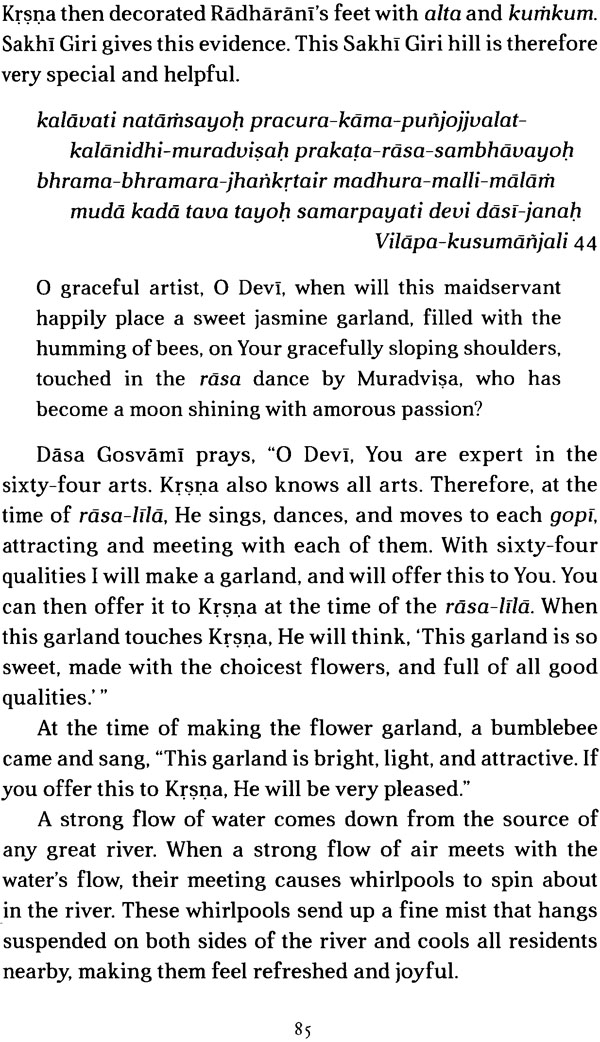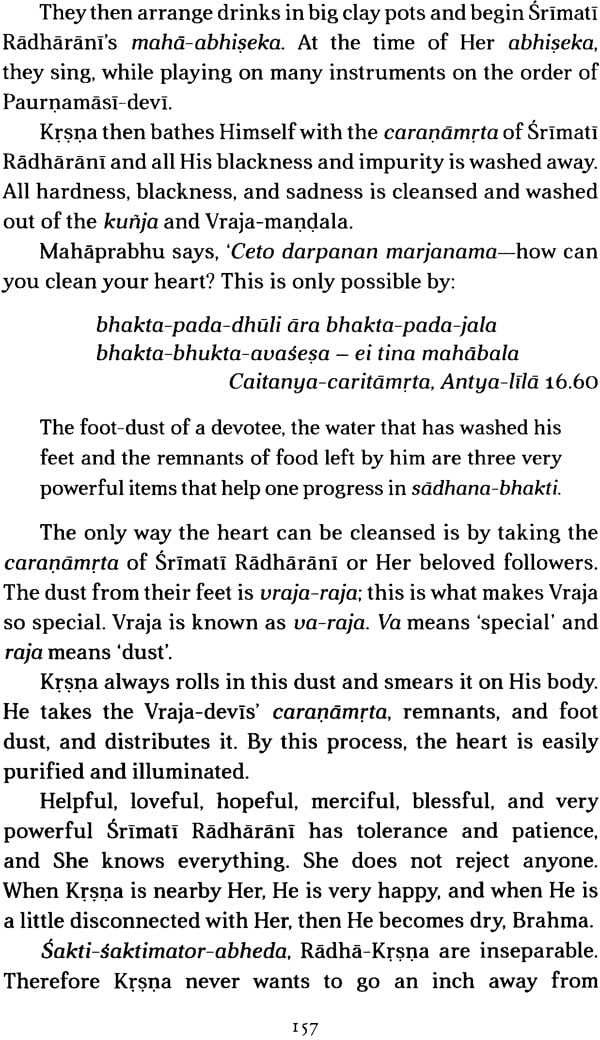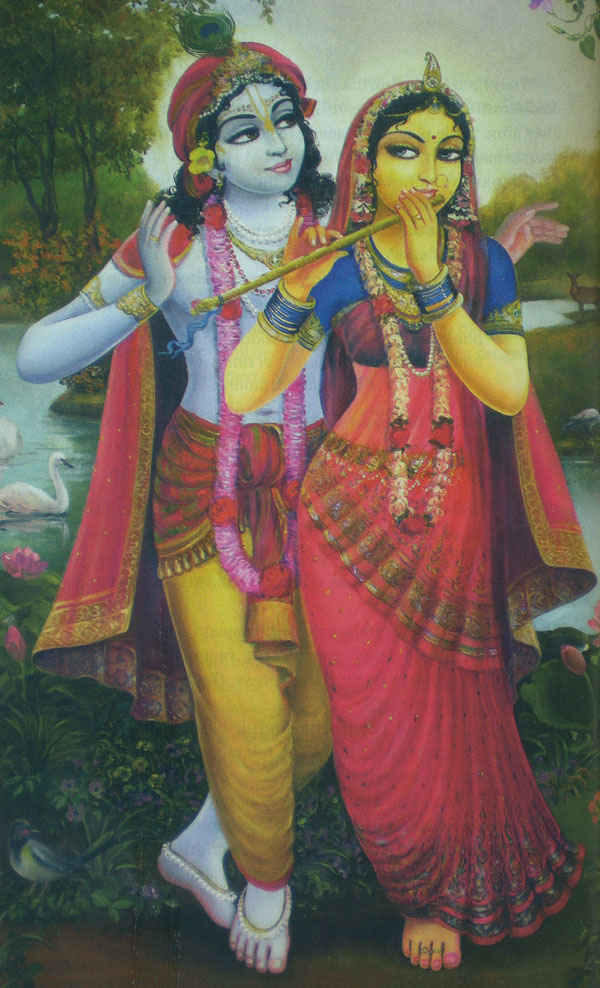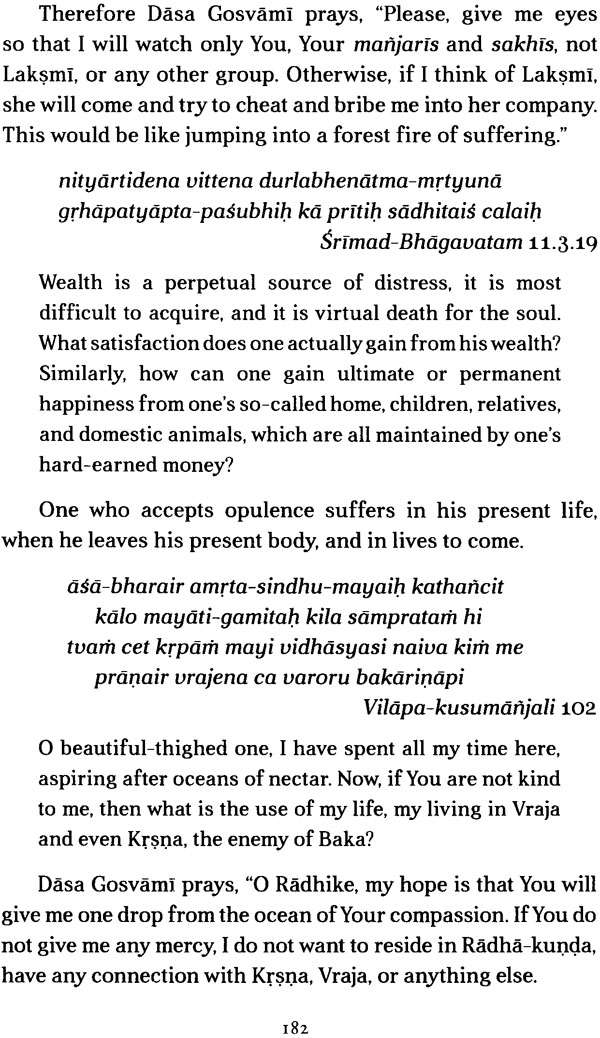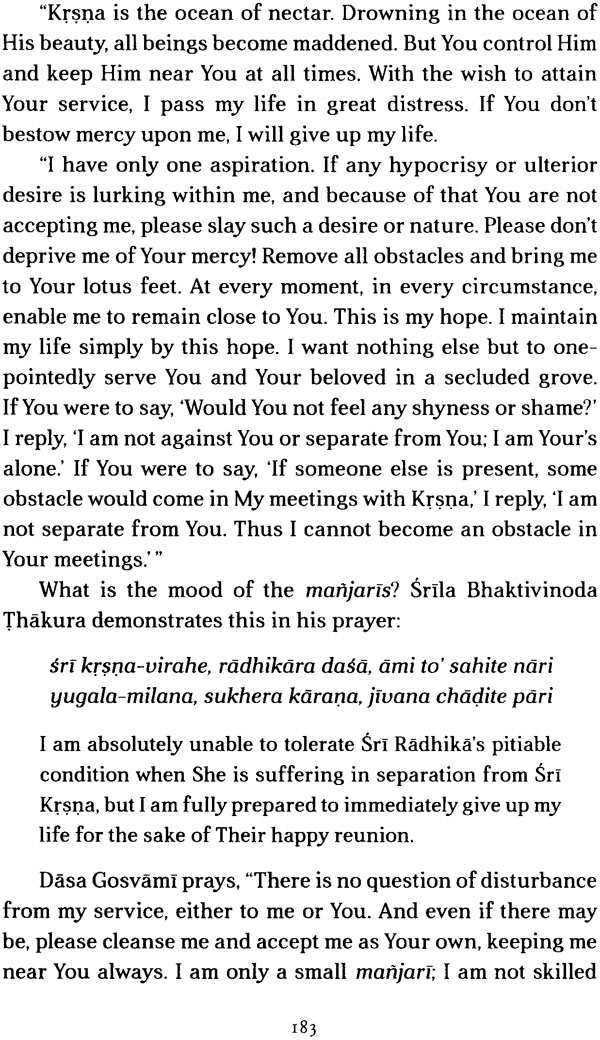
A Bouquet of Woeful Entreaties
Book Specification
| Item Code: | NAK051 |
| Author: | Srila Narayana Maharaja |
| Publisher: | Gaudiya Vedanta Publications |
| Language: | English |
| Edition: | 2015 |
| ISBN: | 9781943614028 |
| Pages: | 224 (30 Color Illustrations) |
| Cover: | Paperback |
| Other Details | 9.0 inch x 6.0 inch |
| Weight | 320 gm |
Book Description
Lord Caitanya Mahaprabhu offered Raghunatha dasa Gosvami to Svarupa Damodara. Under the shelter and guidance of Svarupa Damodara, Dasa Gosvami followed the process of service in Vraja.
Caitanya Mahaprabhu instructed Dasa Gosvami:
amani Manada hana krsna-nama sada la'be
vraje radha-krsna-seva manase karibe
Caitanya-caritamrta, Madhya-lila 6.237
Do not expect honor, but offer all respect to others. Always chant the holy name of Lord Krsna, and within your mind render service to Radha and Krsna in Vrndavana.
By sincerely chanting the holy names, while respecting all according to their position, and not being eager for respect from others, the tendency to serve Radha- Krsna in Vraja shall arise. As a result of pure chanting, the Lord's form shall appear in the heart, followed by His qualities and pastimes. At that stage, absorption of the mind in Radha-Krsna's pastimes will be natural, not artificial. Krsna and His names are non- different. When one purely chants these, He will come in the heart and perform His loving pastimes with all His associates. His lila-sakti, pastime potency, is always with Him. She gives the tendency and qualification to serve Krsna.
When greed comes to serve Krsna in one's eternal spiritual form, in time, that greed shall reveal one's eternal loving mood towards Krsna. Then one begins to serve Krsna under the guidance of His associates. This love matures sequentially through higher and higher degrees up to mahabhava.
Nourished by transcendental nectar, or rasa, the soul develops its spiritual form and nature and becomes related to God.
Bhakti with a feeling of loving intimacy is dear to Krsna. That is the only kind of worship present in Vraja. Caitanya Mahaprabhu manifested this process in the heart of Raghunatha dasa Gosvami, and through him, distributed it to the world. Dasa Gosvami showed by his own example how to pray for the attainment of that intimate loving mood.
This Vilapa-kusumanjali is a collection of the prayers of Dasa Gosvami offered like flowers to the lotus feet of the Divine Potency of Krsna, Srimati Radharani. By offering the heart to any mundane person, one becomes devoid of all potency and goodness. However, surrendering to Her, one attains all knowledge of Krsna's service and becomes related to Him and His associates without any extraneous effort.
The masses emphasize more on Dasa Gosvami's intense renunciation than his intimate loving mood. Indeed, evidence of the validity of Mahaprabhu's highest conception was shown in the life of Dasa Gosvami as he engaged in manasi-seva in Vraja. To take Raghunatha dasa Gosvami's guidance, taking shelter of his writings is essential. Then one can experience the transcendental nectar that flows through our line. If one takes shelter of this book, he will become firmly fixed in the conception and line of Mahaprabhu. This is our Guru-varga's instruction and conception.
There are two types of anuraga–daksina-bhava and vamya-bhava, right-sided and left-sided. On the left side are our Guru-varga, the followers of Srimati Radharani. But how can we collect this anuraga and continuously be present with it? Therefore very strong sadhana is necessary. If there is no strong sadhana, then it will not be possible to keep and preserve in your heart anything you try to catch. It will come and go; nothing will be sweet and present near you for long.
chapanna danda ratri dine
jane na radha-govinda bine
tara para cari danda suti thake
svapne radhe govinda dekhe
He knows nothing but Radha-Govinda throughout the day and night (56 dandas: 1 danda is 24 minutes). He takes rest for only 4 dandas (1 hr. 36 min.). At that time in his dreams he receives darsana of Radha-Govinda.
The Guru-varga are serving all day long. Within the day they only take rest for one or two hours, and even as they rest they are serving in krsna-lila.
To attain such a state of spiritual rapture, we must follow the Gosvamis' example. This is described in the prayer:
sankha-purvaka-nama-gana-natibhih kalavasani-krtau
nidrahara-viharakadi-vijitau catyanta-dinau ca yau
radha-krsna-guna-smrter madhurimanandena sammohitau
vande rupa-sanatanau raghu-yugau sri-jiva-gopalakau
Sad-gosvamyastakam 6
I worship the Six Gosvamis, who passed all their time in chanting the holy names, singing songs, and offering dandavat-pranama, thereby humbly fulfilling their vow to complete a fixed number daily. In this way they utilized their valuable lives and conquered over eating and sleeping. Always seeing themselves as completely worthless, they became enchanted in divine rapture by remembering Sri Radha-Krsna's sweet qualities.
They don't have taste or relation with the body and senses. One by one they follow the process for attaining that anuraga. Also, if they are late for one minute in any service, then they suffer so much and repent, "Why have I lost one minute?"
They are always ready to help us attain Krsna's mercy and the Vraja-devis' association.
Raghunatha dasa Gosvami resided in Jagannatha Puri under the guidance of Svarupa Damodara, by the order of Caitanya Mahaprabhu. What did he take from Svarupa Damodara? He daily collected the process of unnata-ujjvala-rasa. To practice this, he followed Svarupa Damodara's footsteps at every moment.
He memorized and practiced what he collected from Mahaprabhu, and chanted harinama with intense anuraga.
After Mahaprabhu and Svarupa Damodara disappeared, Dasa Gosvami went to Vraja.
He stayed in Vrndavana and moved about there for sometime, but later he permanently resided at Radha-kunda. From morning to evening he was engaged in chanting harinama, while internally praying for the mercy of the Vraja- devis and Srimati Radharani. This book is his offerings of puspanjali to Srimati Radharani. Puspanjali is an offering of flowers, but this book is kusumanjali, meaning, offering one's desires like heartfelt flowers. He offered his desires like this every day and at every moment. He was never disturbed, nor did he think like many others, "Is this line true?" or "Will Radha-Krsna accept my prayers or not?"
His diksa-guru is Yadunandana Acarya, Balarama Acarya is his priest, and his siksa-guru is Svarupa Damodara Prabhu.
Yadunandana Acarya loved Raghunatha more than his own heart. He gave him diksa-mantra. Haridasa Thakura, Advaita Acarya, Nityananda Prabhu-everyone was pleased with Raghunatha. By everyone's great mercy he followed the rules and regulations of strong vairagya. His mind was never disturbed. He never followed his senses and did not give them even a little bit of time, always being busy for service of Hari, Guru and Vaisnavas.
In Jagannatha Puri, Raghunatha dasa Gosvami was bestowed with a special gift by Caitanya Mahaprabhu. Raghunatha dasa Gosvami said, "I am a very fallen soul devoid of goodness. Nevertheless, Caitanya Mahaprabhu and Nityananda Prabhu were very kind and merciful upon me. They offered me at the lotus feet of Svarupa Damodara. And Caitanya Mahaprabhu Himself gave me a Govardhanasila and gunja-mala." Gunja-mala is Radharani's svarupa, and Sri Govardhana is Krsna's svarupa.
Raghunatha dasa Gosvami is vairagya-murti, a personification of renunciation. It was told about him, "Raghunathera niyama yena pasanera rekha–Raghunatha dasa Gosvami's vairagya is as firm and resolute as lines etched in stone." It was not like one day following bhakti's rules, forsaking any enjoyment, and the next day thinking, "I am a great acarya; taking everything is not bad for me." Raghunatha dasa Gosvami did not think like this. Until his last day in this world, he followed bhakti strongly.
Sri Caitanya Mahaprabhu has said:
vairagi hana kare jihvara lalasa
paramartha yaya, ara haya rasera vasa
vairagira krtya-sada nama-sankirtana
saka-patra-phala-mule udara-bharana
jihvara lalase yei iti-uti dhaya
sisnodara-parayana krsna nahi paya
Caitanya-caritamrta, Antya-lila 6.225-227
If a renunciate is eager for his tongue to taste different foods, his spiritual life will be lost, and he will be subservient to the tastes of his tongue. The duty of a person in the renounced order is to chant the Hare Krsna mantra always. He should satisfy his belly with whatever vegetables, leaves, fruits and roots are available. One who is subservient to the tongue and who thus goes here and there, devoted to the genitals and the belly, cannot attain Krsna.
One should fill his belly with whatever is easily available. By offering Krsna foods in the mode of goodness and honoring them as prasada, the tongue is satisfied and service to Krsna is cultivated. If palatable prasada is easily available, then the tongue's greed will gradually be controlled rather than increased. Vairagis continuously chant harinama and maintain their body with anything simple.
Raghunatha dasa Gosvami never went here and there, wasting his time. He never thought, "How does salt, lemon, pickle, and chili taste?" He had deep faith and attachment. Therefore other things could never come and disturb him. His teachings and his practice were very strong. He had bhajana-nistha and vairagya. Therefore he was always very close to the Guru-varga.
People think, "I have no fault, but the Guru-varga don't give me mercy or shelter." But they don't look at their own faults. What was Raghunatha dasa Gosvami's nature? He stayed with Svarupa Damodara for sixteen years continuously, and never thought, "I will go away." Why? Vairagya and bhajana-nistha were always alive in him. Then how could he be any distance from bhajana and the Guru-varga? Other desires will call me and throw me out if they come, but Dasa Gosvami was not like that.
| Mangalacarana | iv | |
| Introduction | xi | |
| 1 | A Glimpse of Guru's Glory and Mercy | 1 |
| 2 | Fire and Ash | 21 |
| 3 | Moonlit Anklebells | 35 |
| 4 | Cleansing the Spirit | 43 |
| 5 | Loving Service of Love Divine | 55 |
| 6 | A Holy Attempt | 63 |
| 7 | The Gold Guard | 73 |
| 8 | A Student of Anuraga | 79 |
| 9 | Merciful Remnants | 91 |
| 10 | Adharamrta | 99 |
| 11 | Culinary Perfection | 105 |
| 12 | Carana Seva | 117 |
| 13 | The Lake and Her Mercy | 131 |
| 14 | Asulka-dasika | 139 |
| 15 | Quite Contrary | 155 |
| 16 | I am Yours | 167 |
